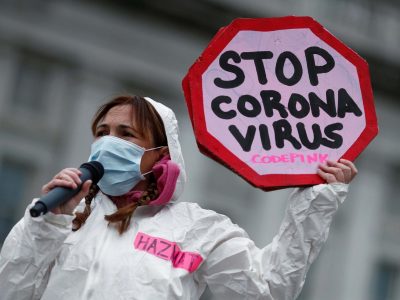Seriously? Gunshot Deaths Counted Among COVID-19 Fatalities in Colorado

A pair of gunshot deaths that counted among COVID fatalities have earned the ire of a county coroner in Colorado.
Grand County, in the sparsely-populated (but breathtaking) northwestern quarter of the state, is home to fewer than 15,000 people and has been lucky enough to endure only a handful of deaths related to the Wuhan Virus.
But of those five deaths, County Coroner Brenda Bock says two actually died of gunshot wounds.
Bock sounded furious in her interview with CBS4 News in Denver, and with good reason. Grand County’s economy is heavily reliant on tourism, and as Bock told CBS4, “It’s absurd that they would even put that on there.”
“Would you want to go to a county that has really high death numbers?” she asked, presumably rhetorically. “Would you want to go visit that county because they are contagious? You know I might get it, and I could die if all of a sudden one county has a high death count. We don’t have it, and we don’t need those numbers inflated.”
Bock told CBS4 that because the victims had tested positive for COVID-19 within 30 days of having been shot, the county classified them as “deaths among cases.”
That’s a curious definition, but one required by the national reporting rules created by the Centers for Disease Control and Prevention.
“Deaths among COVID-19 cases” includes people who died with COVID-19, “but COVID-19 may not have been the cause of death listed on the death certificate.” That’s different from the CDC’s definition of “deaths due to COVID-19.” Those are cases “where COVID-19 is listed as the cause of death or a significant condition contributing to death.”
Let’s put a different spin on those rules and see if we can’t gain a little clarity.
Consider a hypothetical in which your friendly neighborhood VodkaPundit were to get hit by a car while stumbling home from his favorite drinking establishment (heaven forbid!). During my autopsy, it was discovered that I had a small tumor on my liver — because where else would I be likely to get one?
If the CDC were fighting cancer the way it’s fighting the Wuhan Virus, my death would be counted “among” those who died of liver cancer, even though the tumor was small and not yet threatening. Never you mind that what actually killed me was a ’97 Olds Cutlass with that ugly plastic body cladding.
What a terrible way to go, right?
If I’d dodged the Cutlass and gone on to die many years later of liver cancer, my cause of death would be listed as “due” to liver cancer.
The latter is good if you’re trying to keep accurate records. The former is better if you’re trying to keep the public scared and confused about the risk of liver cancer in young people.
But worse than scaring a few tourists away from the lovely Grand Lake Lodge, COVID scaremongering is being used to shutter entire states.
As the official Wuhan Flu death tally rapidly approaches 300,000, we need to pay closer attention to these reporting rules.
The idea that COVID mortality might be overstated — even wildly overstated — is hardly far-fetched. PJ Media’s own Stacey Lennox reported on Wednesday:
One would think in light of these dire predictions and given the horrible toll the response has taken on the economy and young people, the excess deaths due to COVID-19 would be through the roof. But federal data says that does not appear to be the case.
Overall U.S. deaths in 2020 appear to be in line with previous years, according to the CDC’s own data.
Given that people who died “due” to COVID are overwhelmingly either elderly, suffering from an average of 2.6 comorbidities, or both, it isn’t a stretch to conclude that 2020 was the year most were going to die of something.
That’s perhaps a morbid truth, but morbid truths are still truths.
I don’t mean to imply that there’s nothing tragic about this pandemic.
Businesses have shuttered, tens of thousands of them permanently. Educations have been disrupted, jobs lost, and various state governors engaging in acts of tyranny that in saner times would have them driven from office — or worse. My 14-year-old son kind-of/sort-of started his freshman year this autumn but confided in his mom a couple of weeks ago, “I’ve been in high school for weeks and I haven’t made a single new friend.”
That last item is about the least-damning thing you’ll read about what this shutdown year has done to schoolkids.
And when someone dies of a self-inflicted gunshot wound, taking his own life out of COVID-shutdown despair, the CDC doesn’t list that as even “among” COVID deaths.
The Wuhan pandemic has certainly been “among” the causes of many tragedies, but for the most part, our suffering has been self-inflicted.
*
Note to readers: please click the share buttons above or below. Forward this article to your email lists. Crosspost on your blog site, internet forums. etc.
Featured image is from CODEPINK
*** This article has been archived for your research. The original version from Global Research can be found here ***


